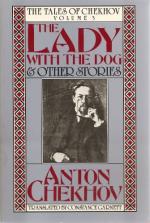|
This section contains 10,558 words (approx. 36 pages at 300 words per page) |

|
SOURCE: Rayfield, Donald. “Melikhovo.” In Understanding Chekhov, pp. 114–34. Madison: University of Wisconsin Press, 1999.
In the following essay, Rayfield surveys the stories Chekhov produced while living on his Melikhovo estate during the 1890s.
The six years that Chekhov lived on his estate of Melikhovo gave him both contentment and frustration, both leisure and physical and mental exhaustion. The stories written at the start of this period, between 1893–5, are among the most intense but not always the most perfect of his mature work. The intensity derives from the re-appearance of women among his active characters and with the theme of the hero's bondage to his heredity, his milieu and his carnality; the imperfections can be traced to the search for a genre and for a narrative approach, a search that does not end until in 1896 the late style of “The House with the Mezzanine” (subtitled “An Artist's Story”) fuses objective...
|
This section contains 10,558 words (approx. 36 pages at 300 words per page) |

|


